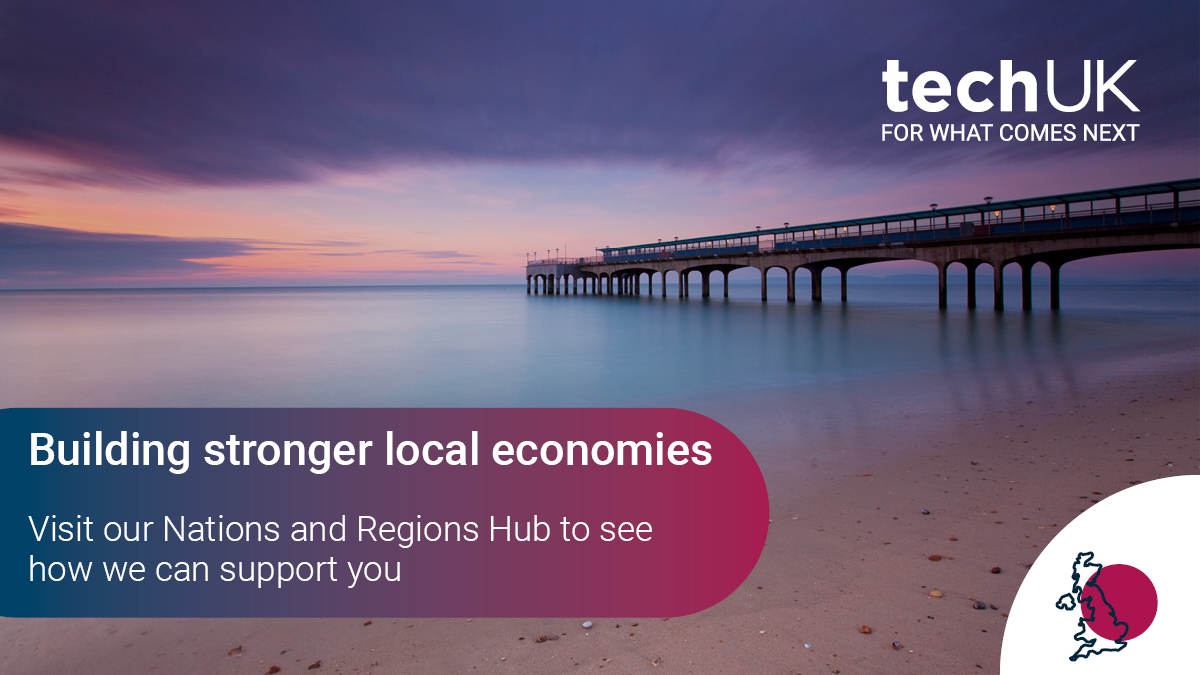Event round-up: techUK Nations and Regions – Local Digital Index 2023 recap – How can the UK’s tech sector strengthen local economies?
- techUK's Index finds that £4.8billion in Digital GVA could be added to the UK economy
- New Nations & Regions Council in 2024, work beginning on Index 2024 and techUK preparing to ensure the role of tech is part of Mayoral plans
- “Regional digital strategies need to drive change and have that accountability. There’s so much potential and that’s what is exciting about the Digital Index”
On 8 December we hosted a webinar discussing the results and findings from our Local Digital Index 2023 report. Matt Evans, Director of Markets at techUK brought us the welcome and talked about the history on the Index, when we started this in 2020 with our digital dialogues across the UK. Since then, there has been significant growth in the Index every year and we now measure regional scoring in cities and counties as well. As a highlight for the 2023 Index, we see that the digital infrastructure across the UK and the West Midlands performs well. It’s also important to note that a good digital adoption score aligns with a good place on the Index overall – it’s a barometer and we need to consider what more we do.
We also heard Sheila Flavell CBE, COO of FDM and techUK President, who highlighted the Digital GVA figure, showing that Digital GVA in London is more that £9,000 per head and in the North West of England it is £2,200 per head and in Wales it’s £1,300 per head, and that if the six regions with the lowest Digital GVA reached the UK median, then this would add at least £4.8billion per annum to the UK economy.
Sheila also announced that techUK would be creating a new Nations and Regions Council for techUK members to join in 2024. This group would set the agenda for techUK’s work in this area including engaging devolved government in Scotland, Wales and Northern Ireland, elected Mayors and capturing the importance of the digital economy for the UK. Adding that planning work had already begun for the Local Digital Index in 2024 including opportunities for members to get involved and even sponsor aspects of this work.
The panel discussion hosted by Matt, included Professor Kerensa Jennings, Director, Data Platforms, BT Group, James Antell, Senior Consultant, Henham Strategy, Claire Delahunty, Faster Britain Ambassador, ITS Technology.
James said: “We need to have evidence-based policy-making and identify areas of best practice to inspire each other as to what really works and to improve the Index and make it consistent for year year-on-year comparisons. There is a concern the fact that we see a drop in high growth companies and this require further analysis. However, the stock of digital capital is heading in an upward direction, and we see a 2.4% increase in digital capital across all components.”
Kerensa, who has also been chairing the Index working group this year said:” The working group allowed us to listen and develop the ideas for the Index and it’s great to see we can influence the questions to councils, government, trade and investment partners, skills providers. This report is a way to open up to challenges and opportunities and one of the most powerful thing we have done is the collation of case studies, spotlighting best practices as there are fantastic examples across the UK.”
Kerensa also called for better granularity of data, saying:” The better the data, the better the outcomes, and the more we can help policy makers.”
Claire sees the Index as “ a starting point, it opens the conversation” that provides a wider perspective, regionally, nationally and internationally. She mentioned that local authorities don’t always talk to each other and it can be eye opening when conversations happen. She is also calling for under-served areas to come talk to ITS Technology about how they can support and find solutions. The gathering of the data and provides a comparative tool and widening minds. It’s not just one piece of the puzzle we need but all of them are important. Claire talked about the joint venture with Liverpool City Region and how they built 200km worth of full fibre with local authorities, supporting over 29,000 businesses.
Claire said: ”No one wants to consider what’s under the ground but it’s the starting point and it enables the applications, so we need to get that bit right to get the investment and the skills development to innovate.”
James also highlighted the urban vs. rural divide, with coastal areas having digital challenges and the importance of digital capital in driving growth across the country. James said that: ”It’s a mixed picture and the detail is important, it covers a huge range of components and it’s not the same fix for all. The common theme is investment, and when it comes to digital capital there’s a clear return on investment.”
There’s an importance in acknowledging that there’s a whole new govt dept focused on what’s needed for tech and digital.
Kerensa talked about the importance of skills development. Kerensa said:” More than 80% of jobs advertised have a digital component. We need to foster a sense of creativity and experimentation in children and ensure key skills are taught such as team working, communication skills, leadership, resilience, problem solving. She also mentioned the growth in apprenticeship schemes at BT Group and the need to be more creative on the apprenticeship levy for instance, bigger organisations gifting the levy to the smaller. We also need to focus on lifelong learning – from small companies to big – to give people a chance to learn and keep learning. Decision makers need to drive investment into skills programmes that drive the right aptitudes in young people.
Claire also agreed that we don’t know the jobs of the future, so we need to drive lifelong learning and drive a wider perspective. We should also support companies to develop their business locally, giving the example of an advanced manufacturer that is opening a new office round the corner. Companies can’t wait, they need us to be more adaptive and drive change quickly, as we need local capital and equity funding on a more local level. Claire said:” Regional digital strategies need to drive change and have that accountability. There’s so much potential and that’s what is exciting about the Digital Index.”
Kerensa also loved the idea of regional digital strategies. She said that it’s not about the IT guy sat alone, but rethinking it to improve decision making, optimise how you get on with day-to-day work, and the incredible potential of digital adoption. We need to invite in experts who understand the power of technology. Kerensa said: ”Let’s help people understand the power and potential of tech…how they can save money and put it into the things that matter.”
We also asked our panellists what would they do if they were a Mayor for a day? Claire said she would focus on convening power because you can start to do things differently and reach the market in a different way, making things happen faster. You can promote that relationship with techUK and be more embedded in each area, asking the uncomfortable questions and develop that network. Kerensa would have a patented 4D data strategy, supported by more granular DATA, really good reporting network and data ecosystems. She would then drive DIAGNOSTICS and using the data in a smart way, creating an interactive, weekly monitored DASHBOARD to understand where are the gaps to drive decision making, in order to drive her DIGITAL ECONOMY. James would drive for more granular data focusing on devolution in adult skills, as like with any component of the Index it’s not something we can be complacent on so we need to be dynamic and nimble.
You can watch the whole event here.
You can download the Local Digital Index 2023 here Local Digital Index 2023 (techuk.org)
Are you keen to be involved in the activities for the Local Digital Index 2024? Get in touch with the Nations and Regions team at [email protected] or [email protected]
Stay up to date with Nations and Regions news by signing up to our newsletter below.

Ileana Lupsa
Ileana Lupsa is the Programme Manager for Local Public Services and Nations and Regions, at techUK.

Matt Robinson
Matt is techUK’s Head of Nations and Regions.
techUK – Building Stronger Local Economies

techUK champions the tech sector throughout the UK. We work with local authorities, devolved government, and local and national policy makers to advocate for the tech sector in strengthening economic growth and resilience. We provide opportunities for our members and local stakeholders to meet, build relationships, and collaborate to drive forward local projects. For more information or to get in touch, please visit our Nations and Regions Hub and click ‘contact us’.
Upcoming Nations and Regions events:
Latest news and insights:
Nations and Regions updates
Sign-up to get the latest updates and opportunities from our Nations and Regions programme.
Contact the team:
Learn more about our Nations and Regions campaign:










